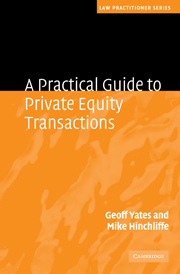Book contents
- Frontmatter
- Contents
- List of figures
- Foreword
- Preface and acknowledgments
- Table of cases
- 1 An introduction to private equity
- 2 The deal process and preliminary matters
- 3 Transaction structures and deal documents
- 4 Acquisition issues
- 5 Equity documentation
- 6 Debt funding
- 7 Employment-related issues
- 8 Pensions
- 9 Tax on private equity transactions
- 10 Public-to-private transactions
- 11 Living with the investment
- 12 Secondary buyouts
- 13 Exits
- Index
9 - Tax on private equity transactions
Published online by Cambridge University Press: 04 May 2010
- Frontmatter
- Contents
- List of figures
- Foreword
- Preface and acknowledgments
- Table of cases
- 1 An introduction to private equity
- 2 The deal process and preliminary matters
- 3 Transaction structures and deal documents
- 4 Acquisition issues
- 5 Equity documentation
- 6 Debt funding
- 7 Employment-related issues
- 8 Pensions
- 9 Tax on private equity transactions
- 10 Public-to-private transactions
- 11 Living with the investment
- 12 Secondary buyouts
- 13 Exits
- Index
Summary
Introduction
In this chapter, we will consider the tax issues for the private equity investor, Newco and the managers of the investee company in respect of a UK private equity transaction, and how such tax issues impact upon the structure of a private equity transaction including the form of debt finance. The tax issues of the different parties are dealt with in turn; however, in reality, many of the issues are overlapping. For example, if Newco is unable to obtain a tax deduction in respect of the coupon upon the investor debt, this will have an impact for both the investor and the managers, as it will result in a higher tax charge within Newco which will impact upon the value of their investment in Newco.
In chapter 3, there is a detailed analysis of transaction structures, including diagrams to demonstrate those structures most often encountered. This taxation chapter assumes a transaction structured in such typical fashion. As outlined in that chapter, it is increasingly common for a double (or more) Newco structure to be used, one reason for such a structure being the desire that the investor's equity funding should be provided to a different company than that to which the investor's debt funding is provided for the tax reasons outlined in section 3.2 below. Generally, where there is more than a double Newco structure, this is driven by the non-tax reasons (such as the desire to achieve structural subordination) discussed in chapter 3.
- Type
- Chapter
- Information
- A Practical Guide to Private Equity Transactions , pp. 266 - 284Publisher: Cambridge University PressPrint publication year: 2010



